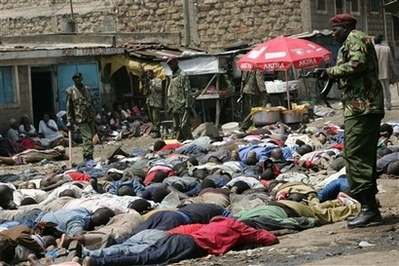国际英语新闻:Kenyans blame police for killings
MATHARE, Kenya -- Residents along this slum's smoky, twisting alleys say they're caught in the middle of a battle between the police and a murderous street gang known for beheading its victims.
|
A report by the state-funded human rights commission on Monday linked police to the deaths of over 450 young Kenyans in the past five months in a crackdown on the gang, known as Mungiki. Police denied involvement, but slum dwellers backed the commission in interviews Tuesday.
"People were arrested in a crackdown against (Mungiki) and have never been found. Relatives say they disappeared without a trace and they don't know if they are dead or alive," said Irungu Wakogi, who owns a restaurant in Mathare, Kenya's second largest slum.
Many of the victims investigated by the commission came from Mathare. Most of the 454 bodies were killed by a single bullet to the back of the head, and dumped in mortuaries around the country despite permanent police roadblocks on all major roads.
Samuel Mwangi, a 40-year-old soccer coach and father of three, said that several people in his area of Mathare had been killed by police after a gang attack killed two officers and stole their guns.
"They hid the guns within the slum and the government reacted, leading to the deaths of many people," he said.
Although Mwangi accused the police of shooting innocent people, he also said the street gang shared responsibility for the violence.
"I can't blame the government for their reaction," he said. "But of course, some people were innocent and police used excessive force."
The report by the Kenya National Commission on Human Rights did not explicitly blame the police for the deaths, but said "circumstantial evidence" linked the police to the killings and said the force seemed to be blocking efforts to find the mystery killers.
Police spokesman Eric Kiraithe said the allegation was "total nonsense." He declined to comment on the commission's figure, but scores of deaths had been reported in the police crackdown on the gang, which is accused of killing of at least 27 civilians -- beheading many of them -- and 15 police officers since April.
The outlawed quasi-political gang draws its support from thousands of unemployed Kikuyu youth. All the murder victims the commission investigated were Kikuyu.
Mungiki, whose name means "multitude" in Kikuyu, began as a group promoting traditional Kikuyu practices, including female genital mutilation, but gradually became involved in extortion, murder and providing hired muscle to politicians.
It was outlaws in 2002 after its members beheaded 21 people in a turf war with a rival gang.
The allegations and denials of police brutality come at a sensitive time. President Mwai Kibaki is seeking re-election in general elections this December. Leading opposition politician Raila Odinga of the Orange Democratic Movement promised to rid the country of Mungiki within a month if he is elected president.
Mungiki members have threatened to disrupt the elections and circulated leaflets in July calling on Kenyan youth to rise up against the government. The government has launched a campaign against electoral violence, featuring children orphaned by political thugs. Already, there have been several election-related attacks on politicians and their supporters.
相关文章
- 欧美文化:Macron visits Berlin on first foreign trip after re-election
- 欧美文化:Ukrainian president, Swedish PM discuss defense support for Ukraine over phone
- 欧美文化:Two suspects arrested for killing 3 Israelis in stabbing attack
- 欧美文化:UN chief calls for end to "cycle of death, destruction" in Ukraine
- 欧美文化:U.S. secretary of state tests positive for COVID-19
- 欧美文化:Hungary "can't support" EU's new sanctions against Russia in current form:
- 欧美文化:Oil prices jump as EU aims for Russian oil ban
- 欧美文化:U.S. Fed on track for half-point rate hike as recession fears grow
- 欧美文化:Killings in U.S. Los Angeles on pace to top last year's high: media
- 欧美文化:Uzbek president appoints new acting foreign minister





 手机网站
手机网站